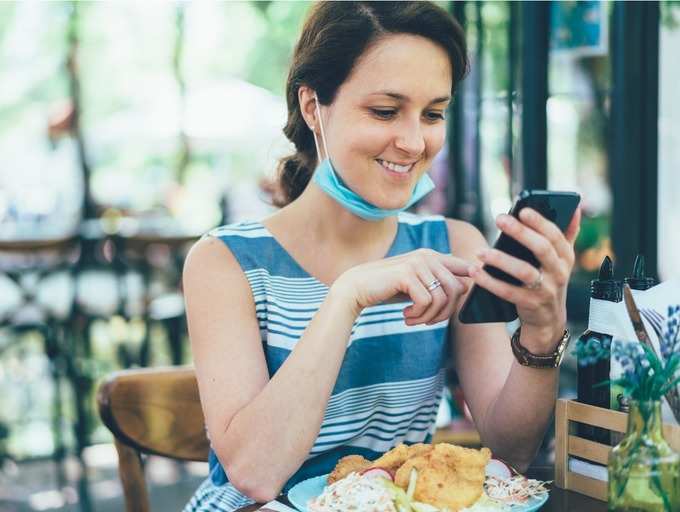Coronavirus: How safe is it to eat in a restaurant?
How safe is it to eat in a restaurant?

Eating out and dining is one of the biggest changes COVID-19 brought in and forced the hospitality sector to take a hit.
Now, after months of lock-down, people have started going out albeit, following precautions. Restaurants, cafes and public spaces, now sport a new look, have customized immunity-boosting menus suited for the customers’ need and safety in mind. But, there still remain concerns. There's still some level of skepticism associated with dining out- What if someone coughs at the next table? How can you make sure that the menu on the table or cutlery has been fully sanitized? Or how safe the food that you are gonna be eating is?
How risky is it to go outdoors?

A recent CDC study also summed up that COVID-19 patients diagnosed positive are twice as likely to have visited a restaurant or dined out before catching the infection, meaning that eating outdoors is sadly, still a super risky activity.
Eating out still remains to be an unsafe activity. Here’s why

Studies have shown that eating at a public space, or a restaurant occupies a higher risk factor than grocery shopping or air travel, no matter the masks, sanitizers, hygiene or social distancing rules are followed.
In places where COVID-19 cases have risen again, indoor and outdoor dining has been constricted.
In another shocking incident, as many as 180 students tested positive for COVID-19 after dining in the same mess at an IIT campus- yet another incident which can make people cautious of eating socially.
As difficult as it is a question to answer, restaurant dining still remains to be one of the riskiest activities to indulge in during COVID-19. So, the main question remains, how safe is it to go out and have dinner? Is visiting a restaurant during the pandemic still out of bounds?
How can you catch a COVID infection from a restaurant?

Unlike other social activities like traveling or shopping, masks do need to come off while eating-which allows for big transmission risk.
Not wearing a mask means that you could be facing a bigger threat of respiratory droplets infecting you.
Even if your servers and the waiters around you do wear a mask or appropriate face covering, risk factors could arise from the ones seated close to you, no matter if there’s a six feet distance being maintained. As studies have shown, aerosol transmission can contribute to a spike in infections, and many virus-carrying droplets can collect on surfaces and latch on to your body- putting you at a higher risk of getting sick.
Asymptomatic infections to blame?

Health experts suggest that nearly 40-50% of COVID patients are asymptomatic in nature, i.e, the people who seemingly seem fit, and showcase no symptoms could be infected and transmit the virus onto you. Even a simple act like talking loudly can spread virus onto other people.
Apart from this, there’s also the added risk of COVID transmission when a person is pre-symptomatic. Studies suggest that a person can posit the highest contagion risk when 2-3 days before symptoms start to show up. Therefore, when you do go out, assume that almost anyone or everyone around you presumes a risk of infection transmission in a social setting like this.
Restaurant capacity and seating can determine the risk

More the number of people seated inside a restaurant, higher goes the transmission and infection risk.
Another big factor to consider inside a restaurant is ventilation. Bad ventilation and air circulation in a confined, closed space like a cafe or a hotel account for more risk than lack of social distancing or crowding.
Poor air circulation, damp spaces can allow viral particles to suspend in the air, deposit onto good breeding surfaces (such as glass or paper) and linger for longer.
A general apathy, not being cautious and flouting COVID norms and rules also contribute to the rising risk of infection when you eat out.
Indoors vs outdoors seating arrangement: Which is safer?

Outdoor dining, or creating safe plastic bubbles have become the newest trend. It may also a tad bit safer than indoor dining.
According to health experts, a person has lower odds of falling sick at an outdoor seating arrangement than he/she would have sitting indoors. Improved air circulation and scattered seating make dining experiences safer.
However, even with outdoor dining, social distancing norms and mask hygiene should be followed cautiously. Enclosed outdoor sitting may breach risk and disturb airflow vital for virus dispersal.
Be cautious about using shared utilities, like the washrooms.

Visits to restaurant bathrooms and washrooms should be refrained, or limited as a measure. This is because COVID traces have also been found in feces and the risk of aerosol transmission, in a mask-less state could prove hazardous.
If you must, do remember to use a mask, practice good hand hygiene, clean up after yourself and limit your visit.
How to make your restaurant visit a little less risky

All being said, if you absolutely cannot avoid eating out, or tired of quarantine fatigue, here are some tips to make your restaurant visit safer for yourself and the waiters serving you:
-Do not touch frequently touched/reusable menu
-Wear a mask when you are in contact with other people, or not eating.
-Wash hands before and after eating and use a good sanitizer.
-Try visiting a restaurant at off-peak hours, when there will be less crowding.
-Pick a table that's spaced out, or go for outdoor dining with better air circulation.
-Don't stay on for long after you are done with your meal.
-Ensure that the tables, cutlery, seats and other surfaces are fully sanitized.
-Try and use contact-less menus/ payments to minimize contact.
-Stay home if you are at a higher risk, or sick with even the littlest of symptoms.
-Lastly, if you experience any anxiety or discomfort, leave. Your mental well-being and comfort come first.